英语2011年《随堂优化训练》人教新目标版九年级Unit 12 Section B
文档属性
| 名称 | 英语2011年《随堂优化训练》人教新目标版九年级Unit 12 Section B | 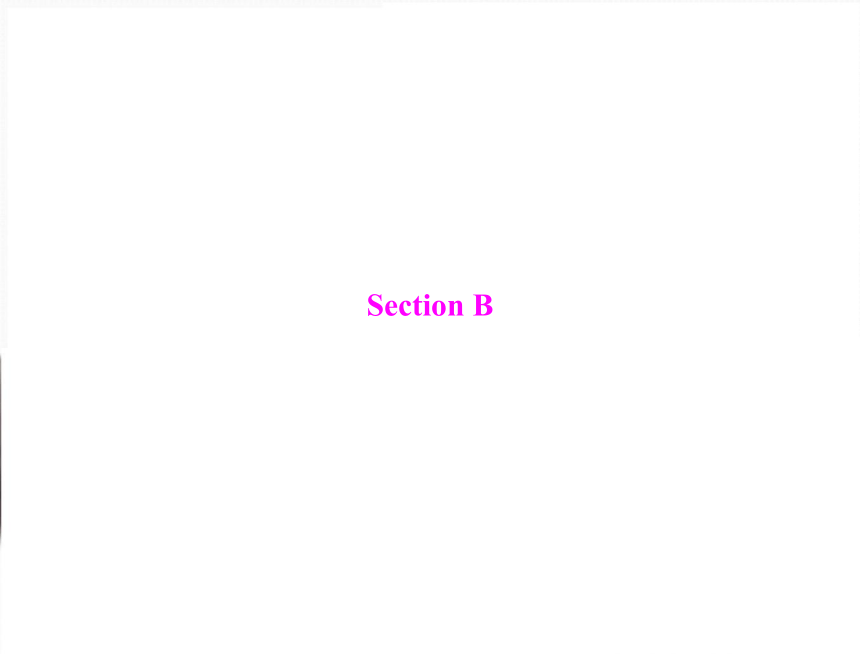 | |
| 格式 | rar | ||
| 文件大小 | 166.0KB | ||
| 资源类型 | 教案 | ||
| 版本资源 | 人教新目标(Go for it)版 | ||
| 科目 | 英语 | ||
| 更新时间 | 2011-11-04 08:00:53 | ||
图片预览

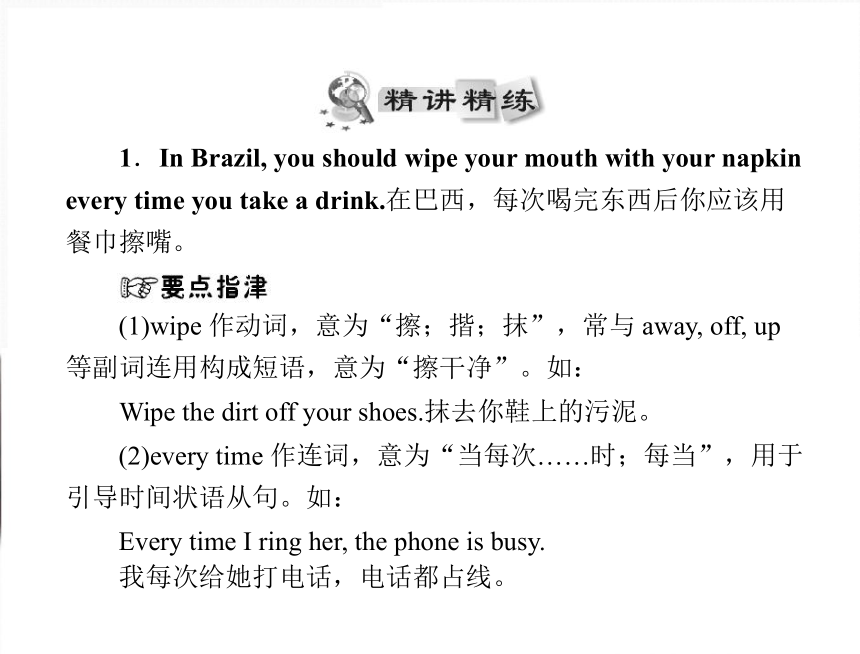
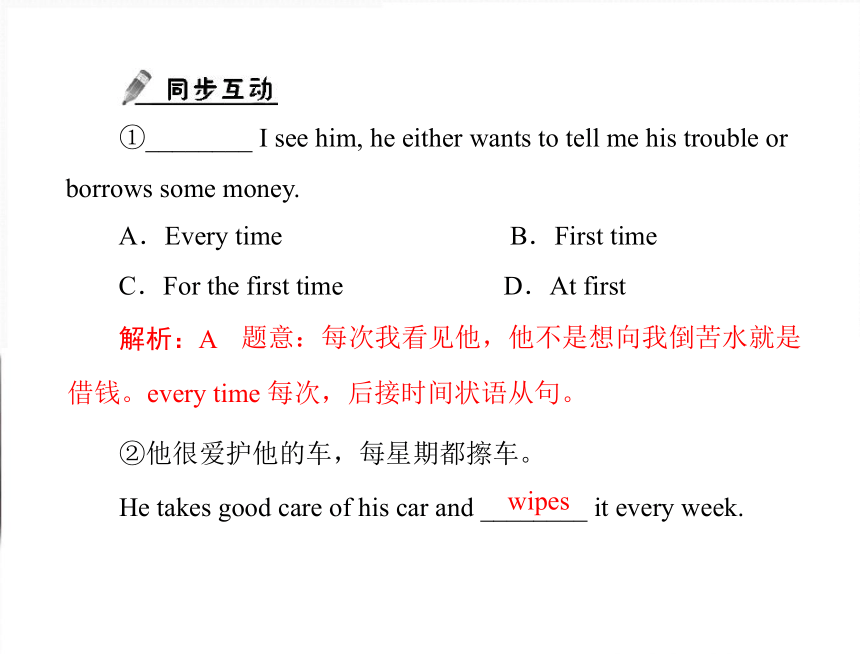
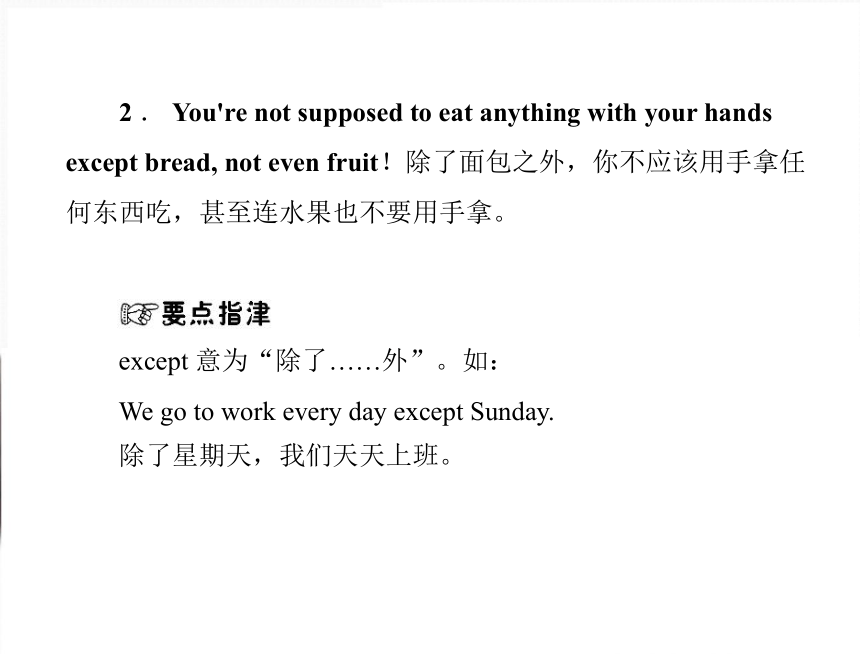
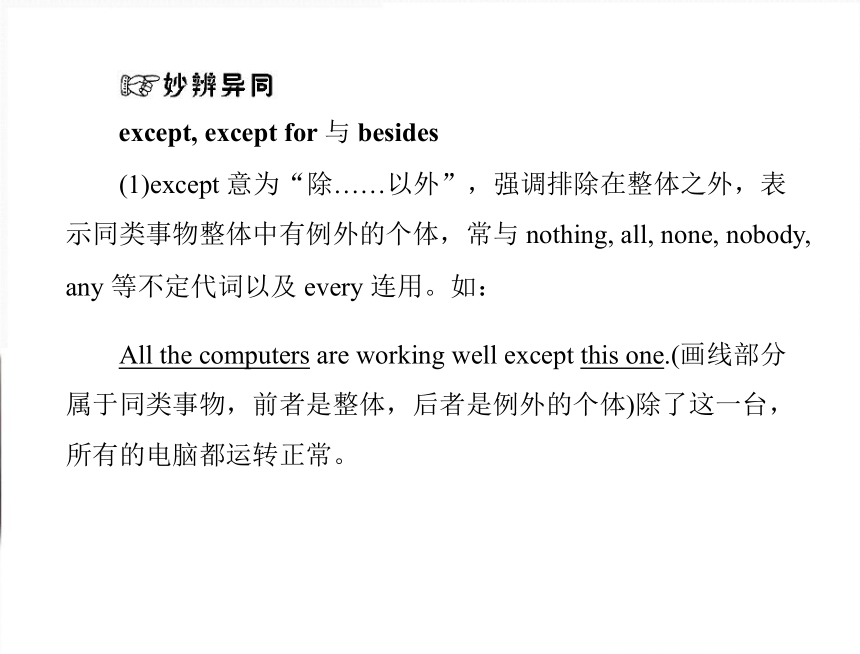
文档简介
(共11张PPT)
Section B
1.In Brazil, you should wipe your mouth with your napkin
every time you take a drink.在巴西,每次喝完东西后你应该用
餐巾擦嘴。
(1)wipe 作动词,意为“擦;揩;抹”,常与 away, off, up
等副词连用构成短语,意为“擦干净”。如:
Wipe the dirt off your shoes.抹去你鞋上的污泥。
(2)every time 作连词,意为“当每次……时;每当”,用于
引导时间状语从句。如:
Every time I ring her, the phone is busy.
我每次给她打电话,电话都占线。
①________ I see him, he either wants to tell me his trouble or
borrows some money.
A.Every time
C.For the first time
B.First time
D.At first
解析:A
题意:每次我看见他,他不是想向我倒苦水就是
②他很爱护他的车,每星期都擦车。
He takes good care of his car and ________ it every week.
借钱。every time 每次,后接时间状语从句。
wipes
2 . You're not supposed to eat anything with your hands
except bread, not even fruit!除了面包之外,你不应该用手拿任
何东西吃,甚至连水果也不要用手拿。
except 意为“除了……外”。如:
We go to work every day except Sunday.
除了星期天,我们天天上班。
except, except for 与 besides
(1)except 意为“除……以外”,强调排除在整体之外,表
示同类事物整体中有例外的个体,常与 nothing, all, none, nobody,
any 等不定代词以及 every 连用。如:
All the computers are working well except this one.(画线部分
属于同类事物,前者是整体,后者是例外的个体)除了这一台,
所有的电脑都运转正常。
(2)except for 意为“除……以外”,表示在肯定整体的情况
下对某个细节方面进行修正,它所表示的是不同类事物之间的
关系。如:
Your composition is good except for a few spelling
mistakes.(错误和文章不是同类事物)
你的这篇作文写得很好, 只是有几处拼写错误。
(3)besides 意为“除了……之外(还有)”,表示两个情况相
同或类似的个体构成一个整体。如:
She knows Japanese besides English.(两者情况相同,构成一
个整体)除了英语之外她还懂日语。
We have also tried Japanese food, ________ western food.
A.except
C.beside
B.except for
D.besides
解析:D 题意:除了西餐,我们也吃了日本菜。由题意可
知此处表示“除了……还有”,故选 besides。
3.I have to say, I find it difficult to remember everything,
but I'm gradually getting used to things and don't find them so
strange any more.我得说,我发现每件事都很难记住,但我渐渐
习惯了这些事情,就不再觉得奇怪了。
(1)句中 find it difficult to remember everything 为“find it+
adj.+to do sth.”结构,其中 it 作形式宾语,后面的动词不定式
短语作真正的宾语,形容词作宾补。可用于此结构的动词还有
think, believe, make, feel 等。如:
I found it hard to do the work all by myself.
我发现独自一人干这活很难。
I think it useful to read English in the morning.
我认为早晨读英语很有用。
(2)get/be used to 意为“习惯于……”,后接名词或动名词
作宾语。如:
We are used to living in the country.
我们习惯了住在乡下。
①I find it interesting ________ skating on real ice.
A.go
C.going
B.to go
D.goes
解析:B “find+it +adj.+to do sth.”结构中,it 作形式
宾语,不定式短语是句子的真正宾语。
C.it
A.this
B.that
② The boy found ________ hard to get along with the other
classmates.(2010 年四川巴中)
解析:C
it 在此作形式宾语。
③We Chinese are used ________ with chopsticks.
A.to eat
B.for eating
C.eating
D.to eating
解析:D
get/be used to doing sth.习惯于做某事。
Section B
1.In Brazil, you should wipe your mouth with your napkin
every time you take a drink.在巴西,每次喝完东西后你应该用
餐巾擦嘴。
(1)wipe 作动词,意为“擦;揩;抹”,常与 away, off, up
等副词连用构成短语,意为“擦干净”。如:
Wipe the dirt off your shoes.抹去你鞋上的污泥。
(2)every time 作连词,意为“当每次……时;每当”,用于
引导时间状语从句。如:
Every time I ring her, the phone is busy.
我每次给她打电话,电话都占线。
①________ I see him, he either wants to tell me his trouble or
borrows some money.
A.Every time
C.For the first time
B.First time
D.At first
解析:A
题意:每次我看见他,他不是想向我倒苦水就是
②他很爱护他的车,每星期都擦车。
He takes good care of his car and ________ it every week.
借钱。every time 每次,后接时间状语从句。
wipes
2 . You're not supposed to eat anything with your hands
except bread, not even fruit!除了面包之外,你不应该用手拿任
何东西吃,甚至连水果也不要用手拿。
except 意为“除了……外”。如:
We go to work every day except Sunday.
除了星期天,我们天天上班。
except, except for 与 besides
(1)except 意为“除……以外”,强调排除在整体之外,表
示同类事物整体中有例外的个体,常与 nothing, all, none, nobody,
any 等不定代词以及 every 连用。如:
All the computers are working well except this one.(画线部分
属于同类事物,前者是整体,后者是例外的个体)除了这一台,
所有的电脑都运转正常。
(2)except for 意为“除……以外”,表示在肯定整体的情况
下对某个细节方面进行修正,它所表示的是不同类事物之间的
关系。如:
Your composition is good except for a few spelling
mistakes.(错误和文章不是同类事物)
你的这篇作文写得很好, 只是有几处拼写错误。
(3)besides 意为“除了……之外(还有)”,表示两个情况相
同或类似的个体构成一个整体。如:
She knows Japanese besides English.(两者情况相同,构成一
个整体)除了英语之外她还懂日语。
We have also tried Japanese food, ________ western food.
A.except
C.beside
B.except for
D.besides
解析:D 题意:除了西餐,我们也吃了日本菜。由题意可
知此处表示“除了……还有”,故选 besides。
3.I have to say, I find it difficult to remember everything,
but I'm gradually getting used to things and don't find them so
strange any more.我得说,我发现每件事都很难记住,但我渐渐
习惯了这些事情,就不再觉得奇怪了。
(1)句中 find it difficult to remember everything 为“find it+
adj.+to do sth.”结构,其中 it 作形式宾语,后面的动词不定式
短语作真正的宾语,形容词作宾补。可用于此结构的动词还有
think, believe, make, feel 等。如:
I found it hard to do the work all by myself.
我发现独自一人干这活很难。
I think it useful to read English in the morning.
我认为早晨读英语很有用。
(2)get/be used to 意为“习惯于……”,后接名词或动名词
作宾语。如:
We are used to living in the country.
我们习惯了住在乡下。
①I find it interesting ________ skating on real ice.
A.go
C.going
B.to go
D.goes
解析:B “find+it +adj.+to do sth.”结构中,it 作形式
宾语,不定式短语是句子的真正宾语。
C.it
A.this
B.that
② The boy found ________ hard to get along with the other
classmates.(2010 年四川巴中)
解析:C
it 在此作形式宾语。
③We Chinese are used ________ with chopsticks.
A.to eat
B.for eating
C.eating
D.to eating
解析:D
get/be used to doing sth.习惯于做某事。
同课章节目录
- Unit 1 How can we become good learners.
- Section A
- Section B
- Unit 2 I think that mooncakes are delicious!
- Section A
- Section B
- Unit 3 Could you please tell me where the restroom
- Section A
- Section B
- Unit 4 I used to be afraid of the dark.
- Section A
- Section B
- Unit 5 What are the shirts made of?
- Section A
- Section B
- Review of Units 1-5
- Unit 6 When was it invented?
- Section A
- Section B
- Unit 7 Teenagers should be allowed to choose their
- Section A
- Section B
- Unit 8 It must belong to Carla.
- Section A
- Section B
- Unit 9 I like music that I can dance to.
- Section A
- Section B
- Unit 10 You're supposed to shake hands.
- Section A
- Section B
- Review of Units 6-10
- Unit 11 Sad movies make me cry.
- Section A
- Section B
- Unit 12 Life is full of the unexpected
- Section A
- Section B
- Unit 13 We're trying to save the earth!
- Section A
- Section B
- Unit 14 I remember meeting all of you in Grade 7.
- Section A
- Section B
- Review of Units 11-14
